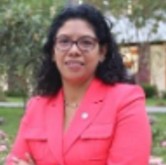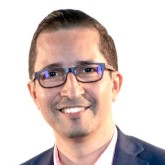
LACLO 2025
November 4–7 – Politécnico Jaime Isaza Cadavid – Medellín – Colombia
20th Latin American Conference on Learning Technologies
Register Here
November 4–7 – Politécnico Jaime Isaza Cadavid – Medellín – Colombia
20th Latin American Conference on Learning Technologies
Register Here
Artificial Intelligence in Education: Between Transformation and Regulation

What if artificial intelligence could understand how we learn in Latin America?

From contemplative and interactive virtual objects to interaction environments.

PhD in Computer Science from the University of La Laguna and PhD in Social Sciences and Education from the University of Huelva. Bachelor’s in Information Systems from the National University of the Northeast (Argentina), officially recognized as Computer Engineering by Spain’s Ministry of Education (1999). She specialized in “Early Childhood Technology” at Tufts University (USA) and in Human-Computer Interaction at the Massachusetts Institute of Technology (USA).
She teaches interdisciplinarily as a Full Professor of Computer Architecture and Technology in the Department of Computer Engineering and Systems at the University of La Laguna (Spain). Her research has focused on applying Artificial Intelligence (AI) techniques and accessible, intelligent interfaces in Education within the Department of Computer Engineering and Systems. She is Director of the Institute for Women’s Studies and leads the research group Interaction, ICT and Education (ITED).
She is also Director of the Interactive Digital Culture Classroom and has served as Director of Educational Innovation and Technology (2011; 2015–2019) at the University of La Laguna. She has five recognized six-year research/transfer periods (sexenios) evaluated by the National Commission for the Evaluation of Research Activity (CNEAI), and two teaching-quality periods rated EXCELLENT (DOCENTIA Program) by ANECA (2012 and 2017).
The conference “Artificial Intelligence in Education: Between Transformation and Regulation” will analyze how AI is redefining teaching and learning processes. Current applications and evidence of impact in higher education and open learning contexts will be presented. At the same time, the European regulatory framework and its influence on interface design and human-computer interaction (HCI) will be examined, addressing ethical, transparency, privacy, and equity issues. The conference proposes a critical perspective to align innovation, user experience, and regulatory compliance, guiding researchers and educational leaders in the responsible adoption of AI.

PhD in Computer Science, M.Sc. in Software Engineering, and Software Engineer. Faculty researcher with publications in Scopus and WoS on AI and Computational Thinking. Member of IEEE and WIE (Women in Engineering), and principal investigator in CONCYTEC projects since 2010. She holds copyrights, industrial designs, and patents, including UNSA’s first international patent (PCT) in 2022. Founder of the startup MEDE (Medical Devices) and Director of the Center for Research, Technology Transfer, and Software Development R&D&I (CiteSoft). Recognized as Peruvian Engineer 2022 and member of CONCYTEC’s Pro-Women in STI Committee.
Her research focuses on software development using artificial intelligence, virtual reality, and the Internet of Things (IoT) to address key challenges in health and education.
This talk offers a critical and inspiring look at the role of artificial intelligence in transforming learning in Latin America. Through applied research and concrete experiences, it explores how Virtual Learning Objects (VLOs) can evolve into truly inclusive, personalized, and culturally relevant tools. It presents models and strategies that integrate AI to adapt content to the rhythms and contexts of Latin American students, ensure accessibility by design, and assess with real pedagogical evidence. The session seeks to open a dialogue on the need to develop purposeful educational technologies, anchored in our realities, recognizing that the future of learning cannot be global if it is first not local.

PhD in the Information and Knowledge Society (UOC), M.A. in Educational Communication (UTP), Specialist in Electronic Journalism (UPB), and Social Communicator (UAO). He also holds university certifications in Digital Video and Online/Offline Technologies (Mecad), Virtual Professor (UCI), Design and Development of Games for Learning, Implementation and Evaluation of Educational Technology (MIT), Leadership in Online Learning – IELOL (Penn State), course design (Moodle), E-learning (IT Madrid), Evaluation of the Quality of Online Programs (Caled), and Quality Matters (QM).
He has been a consultant for organizations such as the World Wildlife Fund, Radio Nederland Training Centre, Suramericana, the Colombian Ministry of National Education, and various Latin American educational institutions; webmaster at Georgia State University; and co-producer at CNN en Español in Atlanta. He is currently the Academic Vice President of Universidad Autónoma de Occidente and provides technical leadership for the Digicampus project for the Government of Valle del Cauca.
The shift of emphasis from the transfer of knowledge—preserved through diverse formats (orality, writing, image, video) and disseminated via various media, contemplative and interactive (classrooms, books, radio, television, internet, virtual and augmented reality, artificial intelligence)—to the cultural appropriation and development of knowledge (propositional, functional, and axiological) within situated (contextual) learning experiences.
Breaking the historical dichotomy between face-to-face and distance/virtual modalities by establishing fluid boundaries between them that unfold across time (synchronous–asynchronous) and space (physical–digital), based on the singularities of a program’s educational project and the access needs of a heterogeneous society.

PhD in Computer Science and Engineering; M.S. in Computational Engineering and M.S. in Computer Science (University of South Florida, USA); Systems Engineer from the Industrial University of Santander.
He was a Fulbright Scholar and a Fellow of the U.S. National Academy of Sciences. He has been principal investigator on projects funded by MinTIC, Minciencias, and the General System of Royalties, achieving the Senior Researcher category from Minciencias since 2014. He has served as a visiting professor at Stanford University and at Universidad Carlos III de Madrid. His interest in creativity and innovation has been complemented by training in the commercialization of science and technology at the University of Cambridge (England) and at KOIKA in South Korea. As an international innovation consultant, he has trained scientists from Latin America, Asia, and Europe within the Science Leadership strategy of the Global Young Academy.
He is currently a council member of the CNA, Director of Research, Creation, and Innovation at Universidad Autónoma de Bucaramanga (Santander); a member of the Departmental Council of Science, Technology, and Innovation in the Department of Santander; a board member of the University-Business-Government Committee of Santander; and Vice President of the Colombian-French Researchers Network, Colifrí.
Research processes at universities around the world have incorporated elements aimed at increasing the likelihood of generating innovations as outcomes of equal or greater importance than the scientific products that have traditionally been promoted. Innovation does not arise solely from the use of scientific or technical knowledge, but also from how research questions or challenges are defined and from the selection and evaluation of the best solution alternative with high innovative potential. In this talk, we will explore how to boost innovation by applying creativity methodologies and tools in research, closing the gaps between knowledge and innovation.